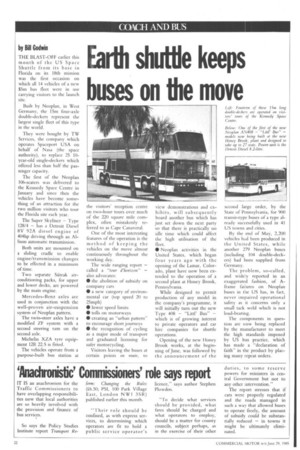Earth shuttle keeps buses on the move
Page 24

If you've noticed an error in this article please click here to report it so we can fix it.
the visitors' reception centre on two-hour tours over much of the 220 square mile complex, often mistakenly referred to as Cape Canaveral.
One of the most interesting features of the operation is the method of keeping the vehicles on the move almost continuously throughout the working day.
The wide ranging report — called a "tour d'horizon" — also advocates:
• the abolition of subsidy on company cars • a new category of environmental car (top speed 20 to 25mph) • lower speed limits • tolls on motorways • creating an "urban pattern" to encourage short journeys • the recognition of cycling as a major mode of transport and graduated licensing for safer motorcycling.
Visitors leaving the buses at certain points en route, to
view demonstrations and cxhibits, will subsequently board another bus which has just set down the next party so that there is practically no idle time which could affect the high utilisation of the fleet.
• Neoplan activities in the United States, which began four years ago with the opening of the Lamar, Colorado, plant have now been extended to the operation of a second plant at Honey Brook, Pennsylvania.
While designed to permit production of any model in the company's programme, it will initially turn out the new Type 408 — "Littl' Bus" — which is of growing interest to private operators and car hire companies for shuttle operations.
Opening of the new Honey Brook works, at the beginning of June, was followed by the announcement of the second large order, by the State of Pennsylvania, for 900 transit-type buses of a type already successfully used in 41 US towns and cities.
By the end of May, 2,200 vehicles had been produced in the United States, while another 279 Neoplan buses (including 104 double-deckers) had been supplied from Germany.
The problem, so-called, and widely reported in an exaggerated fashion, of Aframe failures on Neoplan buses in the US has, in fact, never impaired operational safety as it concerns only a small tack weld which is not load-bearing.
The components in question are now being replaced by the manufacturer to meet the high standards imposed by US bus practice, which has made a "declaration of faith" in the product by placing many repeat orders.




































































































